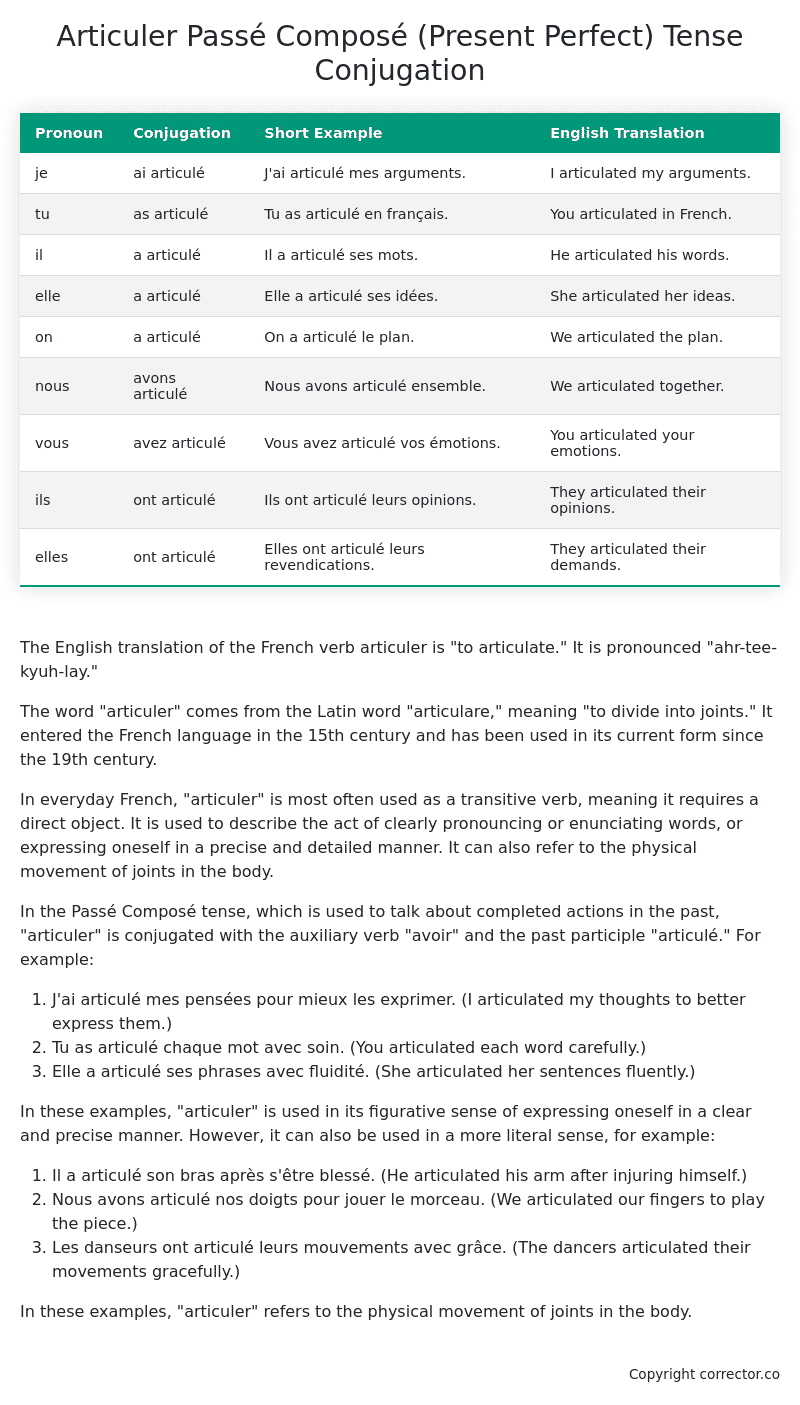Passé Composé (Present Perfect) Tense Conjugation of the French Verb articuler
Introduction to the verb articuler
The English translation of the French verb articuler is “to articulate.” It is pronounced “ahr-tee-kyuh-lay.”
The word “articuler” comes from the Latin word “articulare,” meaning “to divide into joints.” It entered the French language in the 15th century and has been used in its current form since the 19th century.
In everyday French, “articuler” is most often used as a transitive verb, meaning it requires a direct object. It is used to describe the act of clearly pronouncing or enunciating words, or expressing oneself in a precise and detailed manner. It can also refer to the physical movement of joints in the body.
In the Passé Composé tense, which is used to talk about completed actions in the past, “articuler” is conjugated with the auxiliary verb “avoir” and the past participle “articulé.” For example:
- J’ai articulé mes pensées pour mieux les exprimer. (I articulated my thoughts to better express them.)
- Tu as articulé chaque mot avec soin. (You articulated each word carefully.)
- Elle a articulé ses phrases avec fluidité. (She articulated her sentences fluently.)
In these examples, “articuler” is used in its figurative sense of expressing oneself in a clear and precise manner. However, it can also be used in a more literal sense, for example:
- Il a articulé son bras après s’être blessé. (He articulated his arm after injuring himself.)
- Nous avons articulé nos doigts pour jouer le morceau. (We articulated our fingers to play the piece.)
- Les danseurs ont articulé leurs mouvements avec grâce. (The dancers articulated their movements gracefully.)
In these examples, “articuler” refers to the physical movement of joints in the body.
Table of the Passé Composé (Present Perfect) Tense Conjugation of articuler
| Pronoun | Conjugation | Short Example | English Translation |
|---|---|---|---|
| je | ai articulé | J’ai articulé mes arguments. | I articulated my arguments. |
| tu | as articulé | Tu as articulé en français. | You articulated in French. |
| il | a articulé | Il a articulé ses mots. | He articulated his words. |
| elle | a articulé | Elle a articulé ses idées. | She articulated her ideas. |
| on | a articulé | On a articulé le plan. | We articulated the plan. |
| nous | avons articulé | Nous avons articulé ensemble. | We articulated together. |
| vous | avez articulé | Vous avez articulé vos émotions. | You articulated your emotions. |
| ils | ont articulé | Ils ont articulé leurs opinions. | They articulated their opinions. |
| elles | ont articulé | Elles ont articulé leurs revendications. | They articulated their demands. |
Other Conjugations for Articuler.
Le Present (Present Tense) Conjugation of the French Verb articuler
Imparfait (Imperfect) Tense Conjugation of the French Verb articuler
Passé Simple (Simple Past) Tense Conjugation of the French Verb articuler
Passé Composé (Present Perfect) Tense Conjugation of the French Verb articuler (this article)
Futur Simple (Simple Future) Tense Conjugation of the French Verb articuler
Futur Proche (Near Future) Tense Conjugation of the French Verb articuler
Plus-que-parfait (Pluperfect) Tense Conjugation of the French Verb articuler
Passé Antérieur (Past Anterior) Tense Conjugation of the French Verb articuler
Futur Antérieur (Future Anterior) Tense Conjugation of the French Verb articuler
Subjonctif Présent (Subjunctive Present) Tense Conjugation of the French Verb articuler
Subjonctif Passé (Subjunctive Past) Tense Conjugation of the French Verb articuler
Subjonctif Imparfait (Subjunctive Imperfect) Tense Conjugation of the French Verb articuler
Subjonctif Plus-que-parfait (Subjunctive Pluperfect) Tense Conjugation of the French Verb articuler
Conditionnel Présent (Conditional Present) Tense Conjugation of the French Verb articuler
Conditionnel Passé (Conditional Past) Tense Conjugation of the French Verb articuler
L’impératif Présent (Imperative Present) Tense Conjugation of the French Verb articuler
L’infinitif Présent (Infinitive Present) Tense Conjugation of the French Verb articuler
Struggling with French verbs or the language in general? Why not use our free French Grammar Checker – no registration required!
Get a FREE Download Study Sheet of this Conjugation 🔥
Simply right click the image below, click “save image” and get your free reference for the articuler present perfect tense conjugation!

Articuler – About the French Passé Composé (Present Perfect) Tense
Formation of the Passé Composé
Set the auxiliary verb with either
Conjugate the auxiliary verb
Add the past participle
Common everyday usage patterns
Narrating Past Events
Sequential Actions
Describing Completed Actions
Interactions with other tenses
Imperfect Tense
Conditional and Future Tenses
Summary
I hope you enjoyed this article on the verb articuler. Still in a learning mood? Check out another TOTALLY random French verb conjugation!


